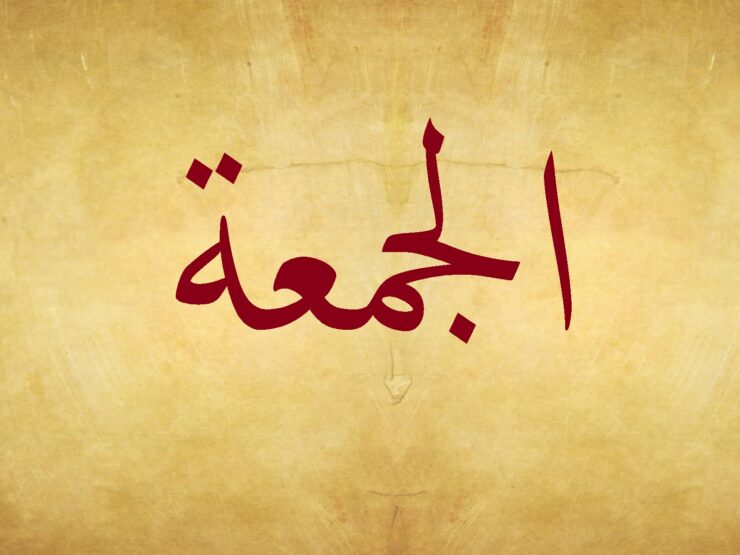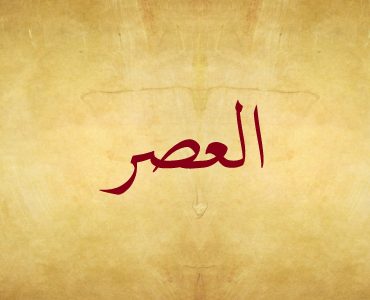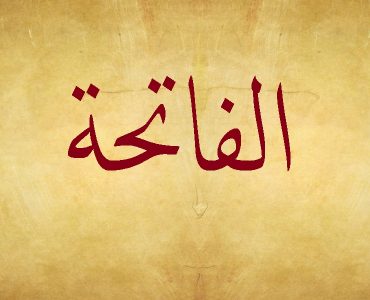| 62. Chapter Friday / Surah al-Jumua |
بسم الله الرحمن الرحيم
In the name of God, The Most Gracious, The Beneficent
يُسَبِّحُ لِلَّهِ مَا فِي السَّمَاوَاتِ وَمَا فِي الْأَرْضِ الْمَلِكِ الْقُدُّوسِ الْعَزِيزِ الْحَكِيمِ {1}
- Whatever is in the skies and whatever is on earth obey[1] God[2], the Sovereign, the Pure, Who is always superior and always judges correctly.
هُوَ الَّذِي بَعَثَ فِي الْأُمِّيِّينَ رَسُولًا مِّنْهُمْ يَتْلُوعَلَيْهِمْ آيَاتِهِ وَيُزَكِّيهِمْ وَيُعَلِّمُهُمُ الْكِتَابَ وَالْحِكْمَةَ وَإِن كَانُوا مِن قَبْلُ لَفِي ضَلَالٍ مُّبِينٍ {2}
- He is the One who has sent to the Ummi (Meccan)[3] a messenger from among themselves. That messenger reads God’s verses to them along with relevant verses, causes them to improve, teaches them the Book and the Wisdom whereas they were in obvious error before that.
وَآخَرِينَ مِنْهُمْ لَمَّا يَلْحَقُوا بِهِمْ وَهُوَ الْعَزِيزُ الْحَكِيمُ {3}
- (God has sent this Messenger) also to others who have not yet joined them (the Meccan)[4]. He is the One Who is always superior and always judges correctly.
ذَلِكَ فَضْلُ اللَّهِ يُؤْتِيهِ مَن يَشَاء وَاللَّهُ ذُو الْفَضْلِ الْعَظِيمِ {4}
مَثَلُ الَّذِينَ حُمِّلُوا التَّوْرَاةَ ثُمَّ لَمْ يَحْمِلُوهَا كَمَثَلِ الْحِمَارِ يَحْمِلُ أَسْفَارًا بِئْسَ مَثَلُ الْقَوْمِ الَّذِينَ كَذَّبُوا بِآيَاتِ اللَّهِ وَاللَّهُ لَا يَهْدِي الْقَوْمَ الظَّالِمِينَ {5}
- The parable of those who were charged with the duty of following the Torah, and thereafter have neglected their duties, is that of an ass that carries a load of books that reveal facts[8] (but cannot benefit from them). What a miserable example it is, the people who lie against God’s signs! God does not guide the wrong-doing people.
قُلْ يَا أَيُّهَا الَّذِينَ هَادُوا إِن زَعَمْتُمْ أَنَّكُمْ أَوْلِيَاء لِلَّهِ مِن دُونِ النَّاسِ فَتَمَنَّوُا الْمَوْتَ إِن كُنتُمْ صَادِقِينَ {6}
- Say: “O you who follow the Jewish faith! If you claim that (only) you are close to God rather than other people[9] and if you are truthful, then wish for your death![10]“
وَلَا يَتَمَنَّوْنَهُ أَبَدًا بِمَا قَدَّمَتْ أَيْدِيهِمْ وَاللَّهُ عَلِيمٌ بِالظَّالِمِينَ {7}
- They can never wish for death due to what they have done with their hands. God knows those wrongdoers.[11]
قُلْ إِنَّ الْمَوْتَ الَّذِي تَفِرُّونَ مِنْهُ فَإِنَّهُ مُلَاقِيكُمْ ثُمَّ تُرَدُّونَ إِلَى عَالِمِ الْغَيْبِ وَالشَّهَادَةِ فَيُنَبِّئُكُم بِمَا كُنتُمْ تَعْمَلُونَ {8}
- Say: “The death that you are fleeing from will certainly meet you.[12] Later on, you will be returned to the presence of the One who knows all that is perceivable and unperceivable. He will let you know what you were doing.”[13]
يَا أَيُّهَا الَّذِينَ آمَنُوا إِذَا نُودِي لِلصَّلَاةِ مِن يَوْمِ الْجُمُعَةِ فَاسْعَوْا إِلَى ذِكْرِ اللَّهِ وَذَرُوا الْبَيْعَ ذَلِكُمْ خَيْرٌ لَّكُمْ إِن كُنتُمْ تَعْلَمُونَ {9}
- O you who believe![14] When the call to that prayer is made on the day of congregation (Jumua)[15], hasten to the dhikr of God (the Quran)[16] and leave off trading![17] This is what is good for you if only you knew.[18]
فَإِذَا قُضِيَتِ الصَّلَاةُ فَانتَشِرُوا فِي الْأَرْضِ وَابْتَغُوا مِن فَضْلِ اللَّهِ وَاذْكُرُوا اللَّهَ كَثِيرًا لَّعَلَّكُمْ تُفْلِحُونَ {10}
- Once prayer has been performed, then disperse throughout the land[19] and seek God’s bounty. Constantly remember (the words of)[20] God so that you may attain what you hope for.
وَإِذَا رَأَوْا تِجَارَةً أَوْ لَهْوًا انفَضُّوا إِلَيْهَا وَتَرَكُوكَ قَائِمًا قُلْ مَا عِندَ اللَّهِ خَيْرٌ مِّنَ اللَّهْوِ وَمِنَ التِّجَارَةِ وَاللَّهُ خَيْرُ الرَّازِقِينَ {11}
- When they saw some trade or amusement, they turned to it and left you standing.[21] Say: “What is available with God is better than amusement or trade.[22] God is the best of providers.”
[1] The heavens, the earth, and everything in them voluntarily submit to the rules set by God (Isra 17:44, Hashr 59:24, Taghabun 64:1). God has created humans and jinn to be tested in the worldly life (Hud 11:7, Kahf 18:7, Dhariyat 51:56, Mulk 67:2), and has given them free will so that they act the way they want in any area of life which are parts of the test. In areas other than these, they cannot live without obeying the laws that God has set in nature. For example, every human needs to breathe, eat, drink, clothe, shelter, sleep, etc.
[2] TaHa 20:114, Mu’minun 23:116, Hashr 59:23-24.
[3] The word “ummi” is used in three different meanings in the Qur’an. The first is “who does not have any knowledge of a divine book” (Al-e Imran 3:20, 75), the second is “who does not know the content of the divine book he believes in” (Baqarah 2:78), and the third is “Meccan” since “ummu’l qur’a” (mother of cities) is the nickname of Mecca (Mufradat.) Prophet Muhammad (pbuh) did not have any knowledge of a divine book before the revelation of the Quran (Ankebut 29/47-48, Shura 42/52-53), but this is not the main reason why he is called “ummi” in the Qur’an. Since it is written in the Torah and the Gospel that the final prophet will descend from Ishmail (pbuh) and will come out of Mecca or Becca (Deuteronomy 18:18,19, Psalms 84:6, 118:22-26; Matthew 21:42-44) the word “ummi” referring to Prophet Muhammad (pbuh) in the Qur’an (A’raf 7/157 -158) means Meccan.
[4] An’am 6:92, A’raf 7:158, Furqan 25:1, Saba’ 34:28, Shura 42:7.
[5] Al-e Imran 3:164.
[6] The verb “shaae (شاء)” derives from masdar “shay (شيء)”, meaning “to do something”. What God does is to bring that thing into existence, and what man does is to exert the necessary effort for that thing (Mufradat). God creates everything according to a measure (Qamar 54:49, Ra’d 13:8). He categorizes everything related to the worldly test as good and bad (Anbiya 21:35). God desires everyone to be on the right path (Nisa 4:26) but only considers those who do the right things on the right path (Noor 24:46). He also inspires people whether what they are doing is right or wrong. Therefore, those who act right feel comfortable, and those who act wrong are distressed (Shams 91:7-10). Accordingly, if the subject of the verb “shaae (شاء)” is God, it means “He did what is necessary” or “He created”. If the subject is a human, it means “he did what is necessary”. Had God not given people the freedom to act according to their preferences, no one would do anything wrong and there would be no such thing as a test (Nahl 16:93). Those who want to place the wrong understanding of predestination in Islam as a basis of faith, by making a great distortion, assigned the verb “shaae (شاء)” the meaning of “iradah”, that is, will and wish. By placing this in Quran commentaries and even in dictionaries, they distorted the meanings of many verses. For further details please see: https://www.islamandquran.org/common-mistakes/false-roots-of-fatalism-in-islam-destiny-and-criteria.html
[7] Hadeed 5:29.
[8] The expression translated as “books that reveal facts” is “asfar (أسفار)”, the plural of “sifr (السِّفْرُ)” (Mufradat). Every volume of Torah is also called a “sifr” (Diyanet İslam Ansiklopedisi – Encyclopedia of Islam, Turkish Presidency of Religious Affairs, art. sifr).
[9] Baqarah 2:111, Maedah 5:18.
[10] Baqarah 2:94.
[11] Baqarah 2:95-96.
[12] Nisa 4:78, Vakqia 56:60.
[13] Zumar 39:7.
[14] The fact that the verse addresses all Muslims as “O you who believe!” shows that the Friday prayer, like other prayers, is obligatory for every Muslim, regardless of gender.
[15] Since the day comes before the night in a day (YaSin 36:40), the first prayer of the day is performed at noon. Therefore, the time of the Friday prayer is noon, and the call to it is made at this time.
[16] The dhikr of God is the Book of God (Hijr 15:9, Anbiya 21:24). The first meaning of hastening to the dhikr of God is going to listening to the Friday sermon. Because the sermon requires to explain a subject by establishing its relation with the verses in God’s Book. Since prayer is performed to learn that dhikr (TaHa 20:14), the second meaning of God’s dhikr is the Friday prayer.
[17] Leaving the trade and going to a certain place for Friday prayer when the call is made, shows that this prayer must be performed in congregation, unlike other prayers. Because other prayers can be performed alone, as well as in a congregation.
[18] The five daily prayers must always be performed without exception, but Friday prayer may be skipped under certain circumstances. For example, -regardless of gender- illness, caregiving, epidemic, old age that makes the person exhausted, extreme heat or cold, excessive rain and mud, lack of security in terms of property and life are accepted as legitimate excuses that revoke the obligation of Friday prayer at that specific time and place. Considering the expression “This is better for you” in the verse, we can deduce that there is another option that is only “good” in comparison to offering the Friday prayer in congregation. The fact that such comparative expression is used only for the Friday prayer and not for other obligatory prayers, confirms that it may be skipped when required. The following narrations are important to show that the Friday prayer differs from the five daily prayers, which must be performed under all circumstances and can never be abandoned:
Narrated Muhammad bin Seereen: “On a rainy day, Ibn `Abbas said to his Mu’adh-dhin, “After saying, ‘Ash-hadu anna Muhammadan Rasulullah’ (I testify that Muhammad is Allah’s Messenger (ﷺ)), do not say ‘Haiya ‘Alas-Salat’ (come for the prayer) but say ‘Pray in your houses’.” (The man did so). But the people disliked it. Ibn `Abbas said, “It was done by one who was much better than I (i.e. the Prophet (p.b.u.h) ). No doubt, the Jumua prayer is compulsory, but I dislike to put you to task by bringing you out walking in mud and slush” (Bukhari, Jumua, 14).
Narrated Aisha, (the wife of the Prophet): “The people used to come alternately from their abodes and from Al-`Awali (i.e. outskirts of Medina up to a distance of four miles or more from Medina)” (Bukhari, Jumua, 15).
[19] The order to disperse when the prayer is performed reveals that the sermon must be delivered before the prayer and there is no other prayer to be performed in the mosque.
[20] A similar verse is Ahzab 33:41. People should always act in accordance with the rules in God’s Book and should keep in mind what is commanded to them.
[21] Narrated Jabir bin `Abdullah: “A caravan of merchandise arrived at Medina on a Friday while we were with the Prophet (ﷺ) All the people left (the Prophet (ﷺ) and headed for the caravan) except twelve persons. Then Allah revealed this verse ..(62.11)”.
There is another narration that this event occurred while Prophet Muhammad (pbuh) was delivering the sermon (Muslim, Jumua, 36).
[22] Nahl 16:96, Noor 24:37, Qasas 28:60, Shura 42:36.







Add comment